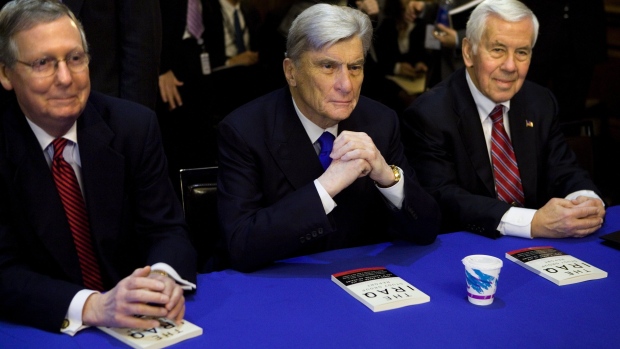May 26, 2021
John Warner, GOP Senate Stalwart With Air of Glamour, Dies at 94
, Bloomberg News

(Bloomberg) -- John Warner, a Republican who represented Virginia in the U.S. Senate for 30 years and brought to Washington a rare aura of glamour including a marriage to actress Elizabeth Taylor, has died. He was 94.
Warner’s former chief of staff Carter Cornick announced the death but did not provide further detail, according to the Washington Post.
Warner retired at the end of his fifth Senate term in January 2009. He was Virginia’s second-longest-serving U.S. senator, behind Harry Byrd Sr., whose tenure ran from 1933 to 1965. He was a senior adviser at Hogan Lovells, the successor to the law firm he first joined a half-century earlier.
Virginia Senator Tim Kaine, a Democrat, lauded Warner as a mentor and friend.
“Not having John Warner to go to for advice leaves a big hole in my life,” Kaine said in a statement. “But we can all celebrate a public servant who stood on principle, made us proud, and exemplified the best of what politics can be.”
White-maned and courtly, Warner exemplified a breed of statesman, open to compromise and negotiation, that became endangered in recent decades as more deeply ideological members of both parties filled Congress.
“At a time when the tone in Washington is so often defined by partisanship and rancor, Senator Warner has always risen above the fray,” Hillary Clinton, then a Democratic senator from New York, said in 2007 when her colleague announced his retirement.
Warner was Taylor’s sixth husband, a marriage that lasted from 1976 to 1982.
“We were always friends -- to the end,” Warner said in a statement following Taylor’s death in 2011. “I shall remember her as a woman whose heart and soul were as beautiful as her classic face and majestic eyes.”
Armed Services Advocate
A former member of the U.S. Navy and the Marine Corps, Warner was one of the last World War II veterans in the Senate. He used his perch on the Armed Services Committee, of which he was chairman when Republicans controlled the Senate, to champion the armed forces and Virginia’s military installations in particular.
“Warner can be grandiloquent and showy, yet he works hard on important issues and has shown steadfastness in his beliefs,” according to the Almanac of American Politics.
Republican presidents saw just how independent Warner could be. In 1987, he voted against confirming Robert Bork, Ronald Reagan’s unsuccessful nominee for the U.S. Supreme Court.
Opposed Surge
Warner was the chief sponsor of a bipartisan resolution in 2007 opposing President George W. Bush’s proposal to increase U.S. troops in Iraq. He held hearings on the Bush administration’s failure to prepare for the aftermath of an invasion of Iraq, and on abuses by U.S. troops of Iraqi prisoners at the Abu Ghraib prison.
In 2007 he split with most Republicans and declared global warming a national security threat. He supported legislation that would cap carbon dioxide emissions.
Warner also acted independently on matters in his home state. He refused to endorse his party’s 1993 lieutenant governor nominee, Michael Farris, a leader in the anti-abortion and home-schooling movements. Farris lost and blamed his defeat on the senator.
The next year, Warner endorsed independent Marshall Coleman for Senate over the Republican nominee, Oliver North, who had a central role in the Iran-Contra scandal under Reagan. North lost to the Democratic incumbent, Charles Robb.
Centrist Stance
Warner’s dogged centrism earned him a challenge from the right in 1996, when former Reagan budget director James Miller III ran against him in the Republican primary.
“I can’t yield my independence to a political party or anyone else,” Warner told the Virginian-Pilot newspaper in 1995. “If I can’t be my own man, I can’t feel good about my work.” Warner defeated Miller, winning 65 percent of the vote.
John William Warner Jr. was born Feb. 18, 1927, in Washington to John William Warner, a surgeon, and Martha Budd Warner.
After serving in the U.S. Navy during World War II, Warner attended Washington and Lee University, where he graduated in 1949. He enrolled in the Marine Corps Reserve and was sent to Korea in 1951. He graduating from the University of Virginia Law School in 1953.
He clerked for the late U.S. Circuit Court of Appeals Judge E. Barrett Prettyman, served as an assistant U.S. attorney, and worked for the law firm Hogan & Hartson, now Hogan Lovells.
Navy Secretary
In 1957, he married Catherine Mellon, granddaughter of billionaire Andrew Mellon. They had three children. Their marriage ended in divorce.
In 1969, he became undersecretary of the Navy, and succeeded John Chafee as secretary of the Navy in 1972.
Warner headed the commission overseeing the American Revolution bicentennial from 1974 to 1976.
He was not his party’s first choice for Senate when he initially sought the office in 1978. He was tapped only after the Republican nominee, Richard Obenshain, died in a plane crash.
At the time, Warner was best known for his 1976 marriage to Taylor, whom he met when the British ambassador asked him to escort her to an embassy party. Warner won his seat by less than 5,000 votes.
After his divorce from Taylor in 1982, Warner married Jeanne Vander Myde, a real estate agent, in 2003.
©2021 Bloomberg L.P.








